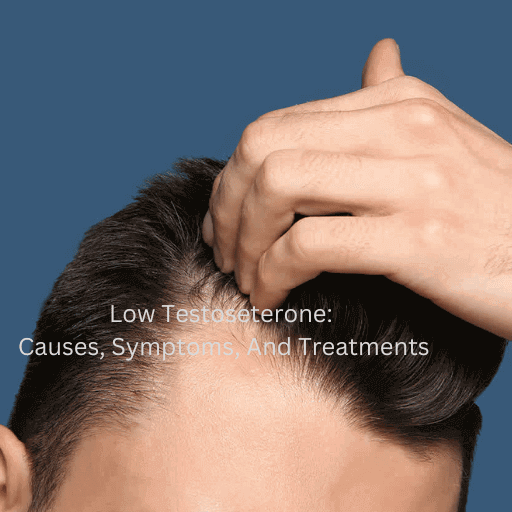It is a natural part of the aging process for men’s testosterone levels to drop. Male testosterone levels decline by roughly one to two percent per year after age 40. A dramatic decline in testosterone, on the other hand, is not typical and can cause a variety of symptoms.
Millions of men experience low testosterone, which can cause fatigue, weight gain, muscle loss, and decreased libido. In the United States, low testosterone affects about 25% of males.
What is testosterone?
The human body produces the hormone testosterone. While both the adrenal gland and the ovaries contribute to female testosterone production, the amounts are significantly lower than in men.
These are responsible for producing the male hormone testosterone.
Why is testosterone important to us?
The male hormone testosterone influences a man’s physical and sexual development and attractiveness. Low levels of testosterone in men can have unfavorable effects on a wide range of bodily functions.
How can You tell if I have low testosterone?
Low testosterone can cause a variety of symptoms that can affect every part of your life, not just your sexual one. Indicative of low testosterone levels include the following physiological and mental signs:
Symptoms of low testosterone in the body
The symptoms for this issue may include the following:
- Impairment of erection
- Ejaculation before it’s time
- Loss of energy; exhaustion
- low stamina
- Alarmingly low muscle strength or power
- Pain in the muscles, joints, and bones
- Performance declines in the workplace and in athletics
- Gaining weight, especially around the middle
- Rapid hair loss
Psychological symptoms of low-T:
- Slow sex drive
- Decreased motivation
- Having less fun in life Having low self-esteem
- Depression
- Anxiety
- Bad mood, a state of irritation
- Swings in Mood
- Confusion in the head
As you can see from the lists above, many of the symptoms are generic and may indicate a variety of health problems. which is why most people don’t even consider low testosterone or have it dismissed as a possibility. There is no need to avoid dealing with this problem because of the availability of treatment alternatives; prompt diagnosis and therapy can improve the quality of life significantly.
Possible reasons
There are a variety of considerations for persons who are low on testosterone. Some of the causes of low testosterone are as follows:
1. Stress
Stress is the primary culprit blamed for decreased testosterone levels. When we talk about stress, we’re not just referring to little jolts here and there. Persistent stress over a long period of time, months or years, can alter your body’s hormone secretion in significant ways.
2. Obesity
Excess obesity creates high levels of estrogen and decreases testosterone. Testosterone levels can drop by as much as 50% in morbidly obese persons. Additional problems, such as stress and depression, are brought on by obesity.
3. Sedentary Lifestyle
This may be linked to being overweight, although inactive persons of any weight can suffer from low testosterone. Lifting weights is a wonderful strategy to increase your testosterone level. The body should feel “spent” after a workout, meaning it has been challenged to its limits.
4. Insulin Resistance
C-reactive protein overproduction can indicate two different health issues in the body. First, your blood is insulin-resistant, and second, you’re in danger of having low testosterone levels. Inflammation brought on by these C-reactive proteins is what ultimately raises one’s risk of developing diabetes.
5. Xenoestrogens
Many xenoestrogens are found in genetically engineered foods. Phthalates, insecticides, and tobacco all include these synthetic estrogens. It decreases testosterone production by artificially increasing estrogen levels in men.
Women are likewise vulnerable to increased cancer risks due to this.
6. Age
After you reach the age of 30, your testosterone levels begin to gradually decrease. The decline is slow, occurring at a rate of 1-2% per year on average. In their later years, men may start to experience the symptoms of low testosterone.
Diagnosis
After discussing your symptoms with your doctor, you and your physician may decide to look into the possibility of low testosterone. Fortunately, a blood test can accomplish this. A diagnosis of low testosterone is often made at a testosterone level below 300ng/dl (300 nanograms per deciliter). After reaching the age of 30, it is typical for testosterone production to gradually decline. Nonetheless, age, health, and genetics all have a role in determining the typical range of testosterone levels, which can be anywhere from above 300ng/dl to as high as 1000 ng/dl.
Treatment
Low testosterone can be easily and effectively treated. Hormone replacement therapy, which can be administered via injection or prescription, is the standard method of treatment. Treatment with testosterone replacement is only available with a doctor’s prescription, and only he can advise you on whether or not the therapy is appropriate for you.
Low testosterone levels are associated with decreased energy and endurance in males since the hormone plays such an important role in regulating healthy red blood cell formation. Consistently low testosterone levels can cause men to lose muscle, have worse bone density, gain weight, and put them at risk for conditions like type 2 diabetes if they are not treated.
Conclusion
About one-quarter of men experience low testosterone, and many don’t receive the hormone replacement medication they require.
Once a low testosterone level problem has been identified, regular visits to the best sexologist are essential.
FAQs
1. What impacts do low levels of testosterone have?
Reduced testosterone levels might disrupt the body’s regular processes. Muscle loss, diminished libido, impotence, and emotional swings like anger and melancholy may all result from them.
Is low testosterone everlasting?
Low testosterone symptoms aren’t something you have to put up with forever. You can restore normal testosterone levels with a combination of lifestyle adjustments and medical interventions.
3. What deficiencies cause low testosterone?
In a new review, researchers discovered that low levels of vitamin D were independently linked to low testosterone in otherwise healthy middle-aged males. Low testosterone levels in otherwise healthy middle-aged men have been linked in a new study to insufficient vitamin D.




